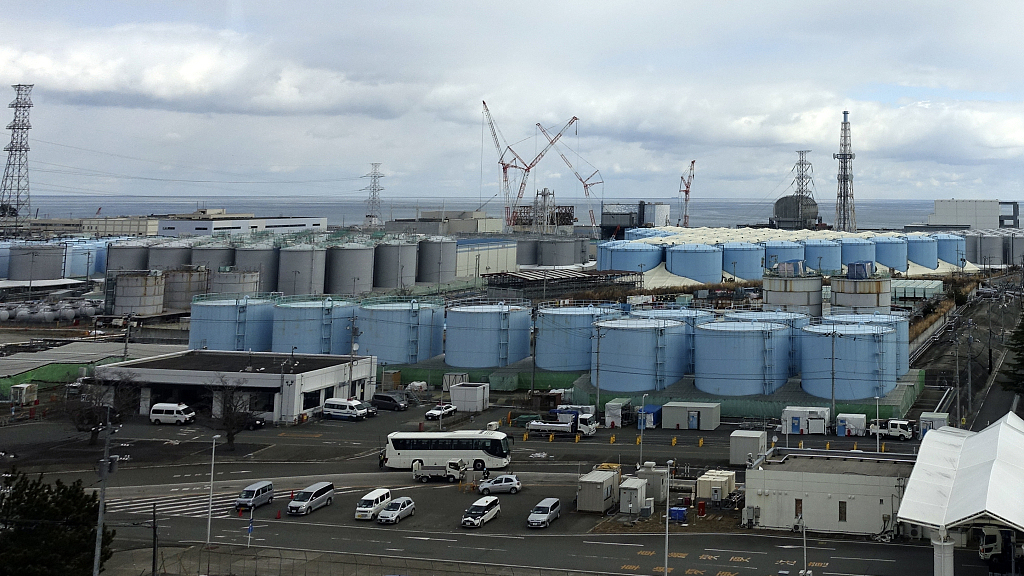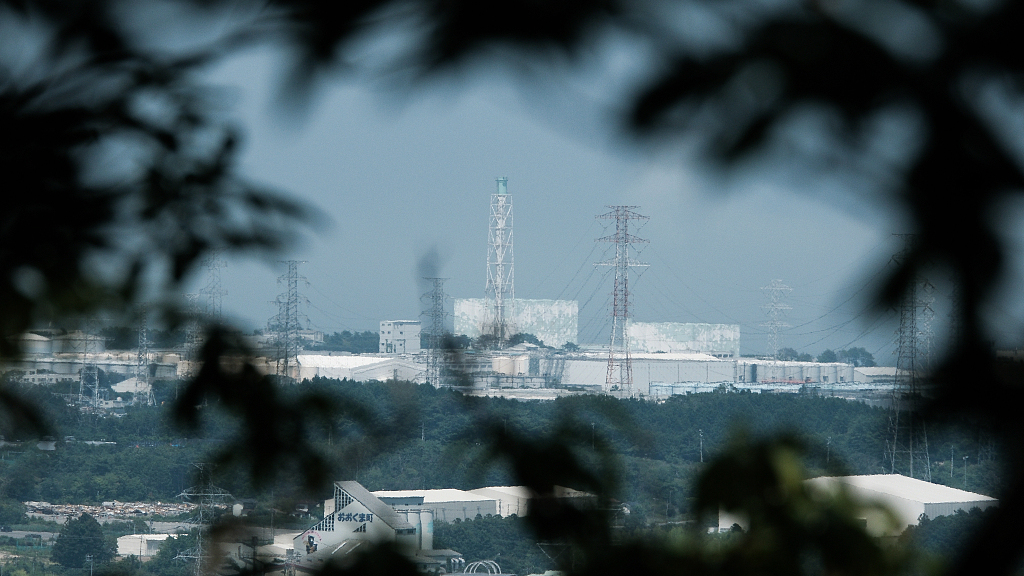
About 1,000 huge tanks holding treated but still radioactive wastewater at the Fukushima Daiichi nuclear power plant in Okuma town, Fukushima Prefecture, Japan, February 22, 2023. /CFP
About 1,000 huge tanks holding treated but still radioactive wastewater at the Fukushima Daiichi nuclear power plant in Okuma town, Fukushima Prefecture, Japan, February 22, 2023. /CFP
The Chinese Ministry of Foreign Affairs reconfirmed on Thursday that Japan's discharging nuclear-contaminated wastewater into the sea is "a gamble with no precedent" and full of uncertainties.
Concerns about the discharge plan focus on the radioactive materials which remain in the wastewater, treated by the Advanced Liquid Processing System (ALPS), a multi-filter system that can remove radioactive material through a series of chemical reactions.
The International Atomic Energy Agency (IAEA) said in its report that the treatment process can't remove all radioactive material, and tritium can't be removed at all.
The safety, effectiveness and sustainability of the so-called "treated" water have aroused doubts over the years.
Read more: Explainer: Can Japan's ALPS fully treat nuclear-contaminated water?
"According to data released by Japan, nearly 70 percent of ALPS-treated nuclear-contaminated water failed to meet the discharge standards, and the efficiency and reliability of the system will be weakened due to corrosion and aging of the treatment equipment when put into long-term operation," said Wang Wenbin, Chinese Foreign Ministry spokesperson, at a press conference.
Japan's discharge of the nuclear-contaminated wastewater will last as long as 30 years or even longer. "In light of these uncertainties, the international community has every reason to express concerns and disapproval," Wang added.
He said that the discharge plan was preconceived and the request for review and assessment from the IAEA, which is out of domestic and international pressure, was nothing but "a charade."
Liu Senlin, a researcher at the China Institute of Atomic Energy, who participated in the IAEA's technical working group on the assessment of Fukushima's ALPS treatment water discharge into the sea, said that the IAEA monitored and reviewed Japan's plan only after the government unilaterally announced the decision to discharge wastewater into the sea.
The IAEA's assessment didn't include possible disposal options other than sea discharge, nor does it include the effectiveness and long-term reliability of the water purification devices, said Liu.

The Tokyo Electric Power Company's Fukushima Daiichi Nuclear Power Plant in Okuma, Fukushima Prefecture, Japan, July 3, 2023. /CFP
The Tokyo Electric Power Company's Fukushima Daiichi Nuclear Power Plant in Okuma, Fukushima Prefecture, Japan, July 3, 2023. /CFP
Deng Ge, secretary general of the China Atomic Energy Authority, expressed the same concern on Tuesday.
It's uncertain whether the ALPS can remove tritium, carbon-14 and other radionuclides effectively based on past experience, Deng said.
In fact, some Japanese are also concerned about the disposal plan.
"The (Japanese) government and TEPCO pre-determined the plan and the time to release nuclear-contaminated water into the sea before conducting a scientific assessment, which is in reverse order," said Kumpei Hayashi, an associate professor at the Fukushima University.
On IAEA's assessment
Liu said that he feels sorry that the IAEA hastily released an assessment report without sufficient consultation with experts at the technical working group.
Liu believes that the IAEA's assessment was of an international peer review, and it was mainly based on the data and information provided by Japan itself.
During the review in the past two years, discussions on technical issues were conducted among the technical working group, and there were both consensus and differences, but "no consensus was fully formed," said Liu.
The expert said that the report does not mean that the IAEA recognizes the legitimacy of Japan's plan to discharge wastewater into the sea, nor does it mean that it approves the country's plan.
The IAEA also said that the report is "neither a recommendation nor an endorsement" of Japan's releasing of the water stored.
Problems with ALPS
The operation of the ALPS system has seen constant problems in the past years. For example, there was the leaking of highly radioactive water in 2016, and strontium and other radioactive substances were found to have exceeded normal standard in 2018.
In 2021, nearly half of the filters used by the ALPS to absorb radioactive material in exhaust gas were damaged, and these filters had been replaced just two years earlier – yet the system is expected to be used for 30 to 40 years.
In addition, the Asahi Shimbun reported that water level in the Fukushima No. 1 reactor containment vessel dropped by 40 centimeters on March 22, 2022 following an earthquake.